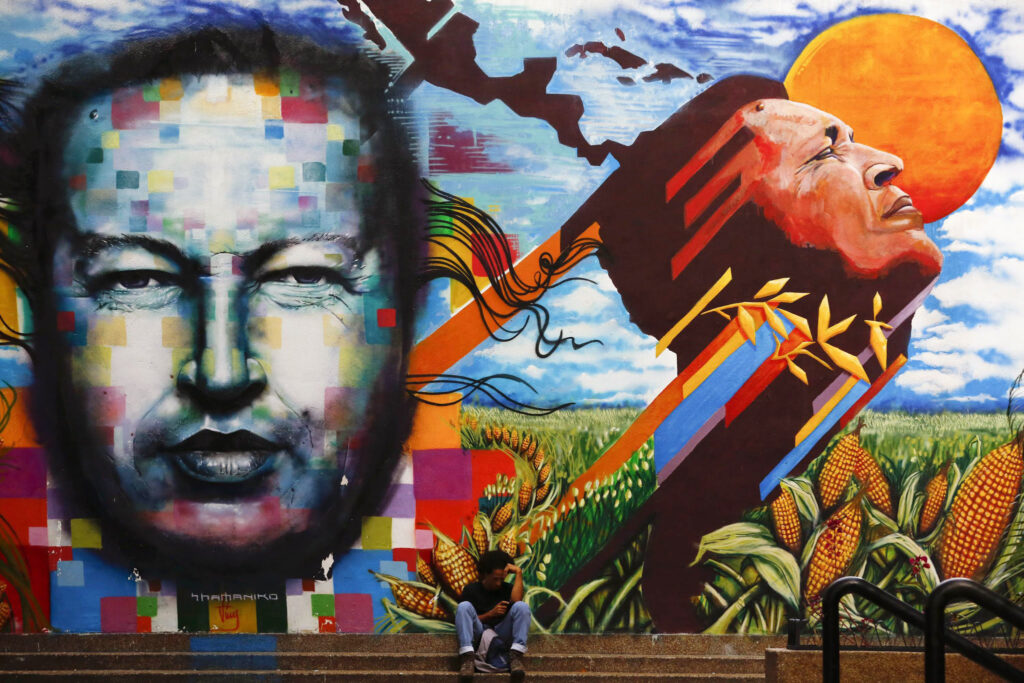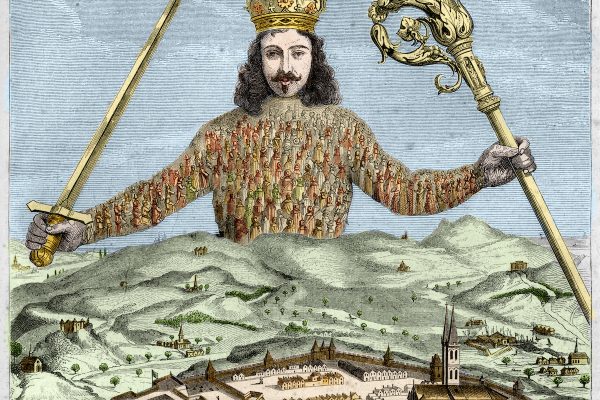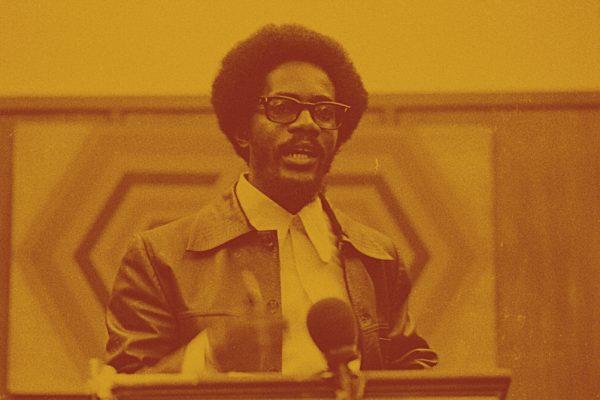Donald Trump is one of the most successful examples of how populism reformulates the old authoritarian premises of fascism in a democratic key. His first speech to Congress some weeks ago, which simply recast a repressive and xenophobic version of electoral plebiscitary politics, was not a pivot but rather a typical maneuver in populist politics. As we well know from Trump’s Latin American precedents, like Juan Perón and Hugo Chavez, changes in tone or changes in position are an expression of the types of demagoguery and opportunism that Trump embodies so well. In fact, saying one thing and doing another defines Trump’s populism. He can change positions back and forth, as he has done many times during his campaign. And as has been the case for most populist regimes in history, from Argentine Peronism and Brazilian Varguismo to the more recent regimes of Viktor Orban in Hungary, Nicolas Maduro in Venezuela, and Rodrigo Duterte in the Philippines, Trumpism thrives on crisis and polarization.
The fiction that Trump, who represents an electoral minority, is the voice of the people and acts in their name has many Latin American precedents. Populist leaders in the region have long claimed to be that voice. Moreover, they conflated their own personas with the people as a whole. Hugo Chavez famously said about himself: “I am no longer myself, I am incarnated in the people. Chavez has become the people and we now are millions.” Evita Perón similarly said, “I will return and I will be millions.” Both leaders said that this identification with the people would continue even in death. Like them, Trump pretends to be the incarnation of the entire American people. This is dangerous because, in both cases, opposition to the leader can be construed as undermining national unity.
The fiction that Trump is the voice of the people and acts in their name has many Latin American precedents.
It is important not to be confused by presidential optics and to keep in mind the repressive and authoritarian nature of Trump’s departure from the standard procedures of American democracy. Trump’s habit of flipflopping on radically opposed positions has become a pattern among populist leaders: Erdogan in Turkey was pro-democracy before he turned into the proto-dictator he is today; Cristina Kirchner was highly critical of Iran before she did a spectacular U-turn by signing an agreement with the country; in the 1970s Juan Domingo Perón praised the guerrillas of the Argentinian left but eventually allied himself with the neo-fascist Peronist right that was responsible for the systematic violence against them. Populist movements are most concerned with the political needs and desires of their leader. In turn, these leaders identify their positions with the will of the nation and the people. The result is that those who do not agree are demonized as being “against the people” and the nation. In short, citizens who just happen to disagree with the leader—such as the independent press, undocumented immigrants, and Muslims—are collapsed into a single entity, the antipatria, what General Perón called the “anti-people” or Trump presents as “enemies of the people.”
While critics of the president point to his use of Twitter as a sign of ineptitude and childishness, Trump, his administration, and his politically disenfranchised voters, believe that programmatic government is a curse to the nation, an obstacle to freedom and prosperity. They believe in dismantling the “administrative state,” to quote Steve Bannon. This is populist anti-politics in a nutshell. The idea that there should be no significant institutional mediations between the leader and his people.
Here again Latin American history provides a useful lesson. In the last decades of the past century, the region was a laboratory for the neoliberal hypothesis that a small state was better than a strong one. As in the United States today, the idea was presented in a populist package. Countries with the biggest economies in South America, like Brazil and Argentina, put forward extreme austerity programs that eventually ended with periods of both political and economic crises. Public education, and social services were undermined, while deregulation and regressive fiscal policies grew. The generally poor results of the experiment in terms of social indicators and economic growth during those decades were not enough, it seems, to contradict the idea that a good state is the same as a weakened state. In short, the results included a substantial increase of inequality, market concentration and the downplaying of small and mid-range business, and, last but not least, a sharp increase in crime.
Hugo Chavez said about himself: ‘I am no longer myself, I am incarnated in the people. Chavez has become the people and we now are millions.’
These policies were attached to an impressive amount of cronyism and corruption at the highest levels of government, which ended in presidents under house arrest (Argentina), resigning from power (Brazil) or even escaping the country (Peru). The governments of Fernando Collor de Mello in Brazil, Carlos Menem in Argentina, Alberto Fujimori in Peru, and many others including Mexico and Chile believed that privatization of public assets, slashing of social expenditures, undermining public education and deregulation would eventually lead to economic growth. With control of two, and soon the three branches of government, the Trump administration seems determined to continue with this experiment in the United States.
But neoliberal Latin American populists like the Argentinian Menem, the Brazilian Collor de Mello, or the Ecuadorian Abdalá Bucaram constantly faced opposition from electoral, labor, and student movements. In the case of Latin America, neoliberal governments eventually lost power to leftist national populist leaders: the Kirchners in Argentina, Evo Morales in Bolivia, Rafael Correa in Ecuador or Hugo Chávez in Venezuela. Democratic institutions also helped to curtail neoliberal populists: Collor de Mello was impeached while Bucaram was deemed by Congress to be too “mentally unfit” to continue being the president.
Looking at Trump and his inner circle as mere neoliberal ideologues misses a big point: among many of the traits they share with past examples of fascism and populism is the desire to create a direct link with the people to consolidate power. Trump is not simply a neoliberal populist but also an authoritarian. A budding authoritarian regime, like the one portended by Trump, is pushing the democratic dimension of populism to its limits. Without having been elected by a majority, he speaks and decides in their name. Historian Richard Evans reminds us that Adolf Hitler received only 38 percent of the popular vote in 1932. Hitler never had the popular mandate and yet he turned the world upside down. Trump won with the electoral college even though he lost the popular vote. Like fascism, populism does not need a striking electoral victory to change the order of things. As with Hitler, Trump does not have a significant popular mandate, but in just a few weeks he has started to reverse decades-old paradigms in international relations, the church-state division, and the foundational notion of the country as a society open to people from all over the world. The comparison of Trump to Nazi Germany is both deceiving and commonplace, but it can be useful if we focus on the inevitable tensions between fascist and populist leaders’ claim to represent the nation as a whole and the procedural obstacles to their projects imposed by democratic institutions. Historically, populism is a democratic reformulation of fascism.
The picture might look dark from this perspective. But it is time to recognize that too many things that “could not happen here” already have. The flurry of activity coming from the Oval Office, including the blitzkrieg of executive orders, has important precedents in the history of fascism and populism. In fact, Trump could consolidate his populist authoritarian regime and prolong his time in office. Consolidation might very well include developing tools of repression against dissent and political opposition. These tools were previously used by both dictatorships and extreme-right populist regimes in Latin America to fight the “enemies of the people.”
Populism is a democratic reformulation of fascism.
In the United States, journalists, civil servants, migrants, Muslims, and protestors have already become the subject of threats from the White House— a mere continuation of the extreme populist rhetoric deployed by Trump’s campaign. While these threats have not yet materialized into overt acts of government repression, the escalation of deportations and the rise in hate crimes are clear signs of an undemocratic trend. The aggressive detention of undocumented immigrants by ICE and other agencies, and the lack of information given to families and lawyers about the whereabouts of detainees, are one example of how state agencies can use technically legal actions to plant fear among sections of the population. It should not be surprising if in the next few months threats become reality. Verbal violence can easily lead to physical violence in the hands of supporters of the regime. The burning of black churches and mosques, the shooting and even killing of immigrants and black people, and the threats against journalists in these past months should not be ignored. Populism can also turn into dictatorship. The dictatorships that started in Germany in 1933, Italy in 1922, and Argentina in 1976 were preceded by acts of terrorism that seemed spontaneous, but were in fact structured by organizations that maintained and increased their power afterwards: the SA and then the SS in Germany, the Fasci de Combattimento in Italy, the Triple A in Peronist Argentina. Preventing something similar in the United States will be the true test of the country’s rule of law.
In many Latin American countries, neoliberal populism was attached to an increase in police repression, an increase in the spying of its citizens, and self-serving manipulation of the justice system. In Argentina, Menem changed the number of Supreme Court justices and famously had a big list of federal judges in his pocket. Peru saw a record number of human rights violations. Trumpism connects neoliberal positions with xenophobic and nationalist ones. This was also the case of the Argentine Junta during the Dirty War. However, the United States is not a dictatorship at war with its own population, but a democracy that is being undermined from the top. It is not necessary to believe in the existence of a deep state, or to subscribe to conspiracy theories, to see that President Trump has enormous resources to act against his real or perceived adversaries. And he has already demonstrated his willingness to do so.








